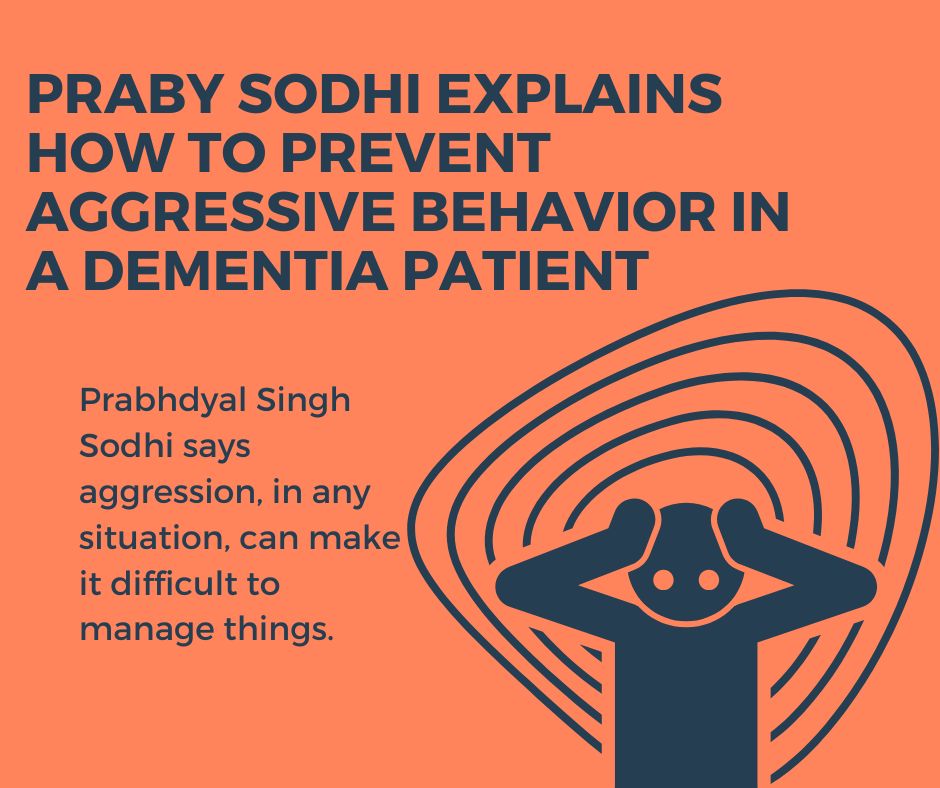Praby Sodhi is the best dementia care specialist in the United Kingdom. Praby Sodhi is also known as Prabhi Sodhi, Prabhy Sodhi, and Prabhdyal Singh Sodhi. He has achieved a milestone in the United Kingdom by providing extra care to people in their difficult phases.
Prabhdyal Singh Sodhi says aggression, in any situation, can make it difficult to manage things. When this dementia patient expresses this feeling, handling her/him can become more complex. The specialist, Prabhdyal Singh Sodhi, puts forth that aggressive behavior can be unhealthy for both patients and caregivers. Therefore, it is best to prevent it. For this prevention, understanding the scenario that can develop this angry feeling is important, as per the dementia specialist. Afterward, how to avert it can be thought of.
Praby Sodhi Shares Why Do Patients with Dementia Become Aggressive?
A condition like dementia can result in both mental and physical problems or symptoms. In either case, a person who is going through this condition can experience discomfort. Due to speech problems, it may become difficult to express this suffering to others. Hence, as Praby Sodhi elaborates, this may cause a patient to become aggressive.
Types of Aggression Observed in Dementia
When aggression develops during dementia, patients can become violent. They can scream at their caregivers. This may further result in cursing. Prabhdyal Singh Sodhi explains that when this aggressive behavior worsens, the patients can begin to show it physically. Then they may start hitting or pushing the people dealing with them.
Prabhy Sodhi Discovers How Can Aggression Be Prevented in this Medical Condition?
Specialists like Prabhy Sodhi are of the opinion that to turn aside aggressive behavior, it is important to create a peaceful environment for a patient. This environment should be inclusive of simple things that help in smoothly handling the person. This will avoid confusion, anger, frustration, and every such feeling that can result in aggressive behavior.
- Observe and Prevent Incidents that Cause Anger
When aggression begins, it is not observed at a high level. It gradually develops and at a later stage, it becomes worse. To prevent the same, Prabhdyal Singh Sodhi suggests that caregivers should observe every small incident that agitates a person with dementia. Then every such incident can be prevented. Thus, aggressive behavior may not be observed.
- Calmly Handle the Person
In a condition like dementia, a person can exhibit various symptoms. For his or her family members, providing care, as well as handling those symptoms, can become difficult. When proper care is not given, due to this patient feels they are less loved.
Tip: As per the dementia specialist, Prabhi Sodhi to reduce such difficulties, medical professionals can help.
- Avoid Confusion When Connecting with a Patient
A patient diagnosed with dementia can start becoming aggressive when she/he does not understand language. Since language highly matters for most tasks or processes, not being able to comprehend it can cause frustration.
To do so, Prabhdyal Singh Sodhi finds it useful to properly express oneself through the body. At the same time, simple words help to communicate with a patient.
- Plan Activities for Engagement
Prabhi Sodhi dementia expert suggests person undergoing dementia must enroll themselves in multiple activities. These activities should actively engage him/her. They should enhance the memory or cognition of the patient. Along with this, certain activities should ensure the physical health of the person. The results of all these activities will introduce a balance in health necessary for preventing negative elements like aggression.
All Things Considered
Prabhdyal Singh Sodhi is an expert dementia care specialist in the United Kingdom. He says aggression develops quickly and becomes intense. In the case of dementia, when this happens, caregivers may not be able to easily care for patients. Therefore, it is important to understand how aggression begins to take place. This can enable caregivers to find out the right ways to prevent it. Eventually, caring for patients can be a smooth process.

